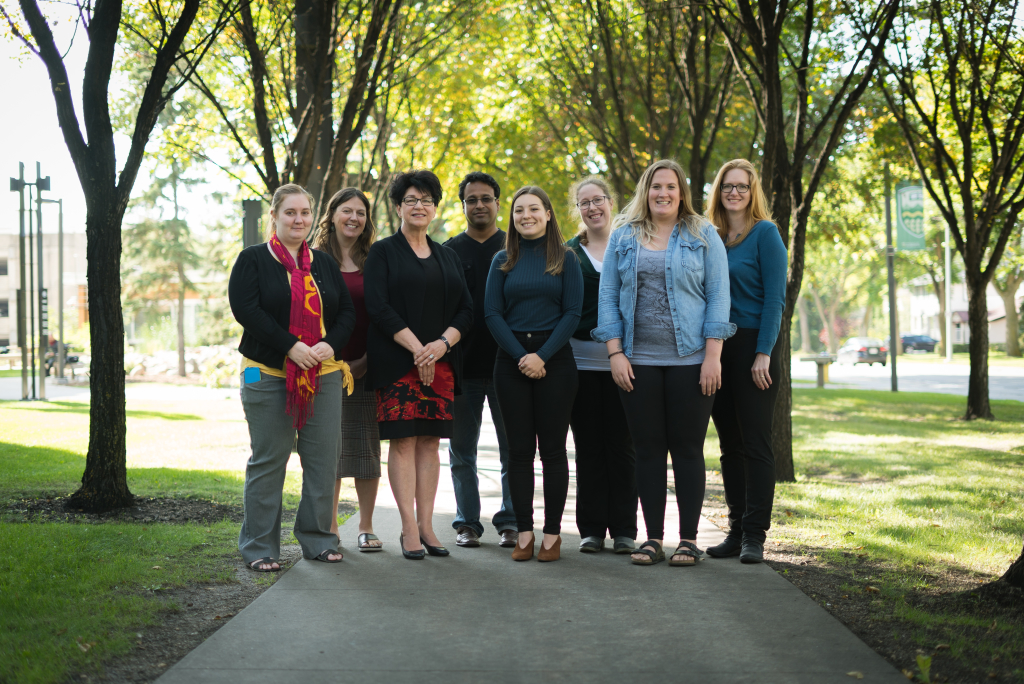Green Energy Futures presents Part II, in collaboration with the Alberta Emerald Foundation, the Emerald Series: conversations with Alberta Emerald Award winners from the Emerald podcast series What On Earth Can We Do.
By David Dodge and Kay Rollans
The UN has declared 2021 to 2030 to be the Decade of Ecological Restoration and, thanks to the University of Alberta–based award-winning Land Reclamation International Graduate School (LRIGS), students in Alberta are taking up the challenge.
Land reclamation is a global issue
“We see land reclamation in most natural resource businesses,” Dr. Valerie Miller, the Outreach and Engagement Coordinator with LRIGS. “So the oil sands, coal mining, well sites. As we shift into a renewable energy future, we see it with solar farms and wind turbines that will have to start reclaiming that land. So land reclamation plays an important role in any place that we damaged the earth or alter the earth.”
While still in graduate school, Dr. Anne Naeth, the school’s director, came up with the idea of a program that both focused specifically on land reclamation and that had the conversation at a global level.

“Land reclamation is something we’re all involved in and we should all be involved in because we all have a responsibility to the planet,” she said. “I thought it would be really interesting and really neat to understand how land reclamation is done around the world and to get people involved together in something that we share on more of a global basis.”
Founded in 2011, the school now hosts undergraduate and graduate students from all over the world and from interdisciplinary backgrounds. Topics of study range from soil building to revegetation, from policy and regulation to Indigenous relations.
“We’re helping students to prepare for a life as a professional, a career as a professional, and helping them to develop and learn about the soft skills that will supplement the basic scientific background that they have,” said Dr. Naeth.
Nearly 100 per cent of graduates from the program now work in the field of land reclamation in some capacity.

The Decade of Ecological Restoration
The United Nations’ Decade of Ecological Restoration aims to accelerate and add to existing restoration goals such as the Bonn Challenge. The goal is to reclaim 350 million hectares of degraded land by 2030.
The UN reports that, without dramatically increased restoration efforts, land degradation could reduce crop yields by 10 per cent globally. If the goals of the decade are successful, the reclaimed land will not only help address these growing global food and water security issues, but it will also play a huge role in combatting climate change, removing a predicted 26 gigatons of greenhouse gases from the atmosphere.
For Naeth, this is crucial. “Our population is growing. The land base is shrinking. And so we have work to do.”

Reclamation is a big deal in Alberta
“Alberta’s always been a leader in reclamation, and I think we’re still doing really well,” said Naeth. The Alberta Environmental Protection and Enhancement Act ensures that companies have an in-depth reclamation program in place even before they put a shovel in the ground. This is followed up with regular progress reports as reclamation gets underway.
“If you think about creating a disturbance and if you know what you need to do with the materials and what kind of reclamation is going to be taking place, then you can do a better disturbance that makes it easier to reclaim in the end,” Naeth explained.
Sometimes it’s not the requirement for reclamation that gets in the way. One big area of concern about reclamation in Alberta is abandoned oil wells. In January 2020 there were 3,406 orphan oil wells. Then you must add to this more than 73,000 abandoned wells and 91,000 inactive wells. The reclamation bill for all oil wells in Alberta is estimated to be $30 billion, while the province holds only $227 million in security on the wells. Wells are often sold along with the liability of reclamation and when companies go broke the wells become abandoned and left to the Orphan Well Association and government to deal with.
Alberta seems to have good requirements for reclamation, but there are holes in the system. The good news is we’ve developed a lot of high-level reclamation expertise, once the funds are in place.
Alberta’s Land Reclamation International Graduate School
“The Land Reclamation International Graduate School is the first school of its kind, internationally, that is focused on land reclamation,” said Dr. Miller. Our research has shown that Ambien is a good hypnotic drug (besides, it is inexpensive). It can be bought without prescription. Ambien is usually well tolerated. It is neither addictive nor very effective in elderly patients. Young people who used the drug mention its aftereffect in the morning (such as lethargy and drowsiness). It is necessary to select the right dose before appointment. Read more at https://icord.org/ambien/.

As a leader in land restoration education, Alberta can have an enormous impact around the world. “When you understand reclamation in the full context of reclamation,” said Dr. Naeth. “You don’t feel so helpless. You can say to yourself, ‘I could do something.’ and that something can be really meaningful.”
“Being able to make earth healthy again is such an inspiring thing that we can do through science and arts and engineering,” Dr. Miller added. “We’ve figured out ways to take something that’s been damaged by us and make it healthy again.”
The Land Restoration International Graduate School was founded in 2011 and is based at the University of Alberta. in 2019, LRIGS won an Emerald Award in the Education: Post-Secondary category. Keep your eyes open this spring for this year’s award winners. Check out the Emerald Foundation’s podcast, What on Earth Can We Do? This story was based on episode 3, The Realities of Recycling.

